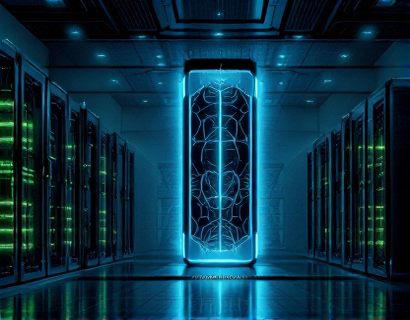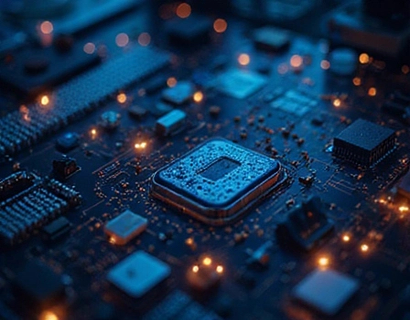Blockchain-Enhanced Registry Software: Revolutionizing Data Management with Security, Transparency, and Efficiency
In the rapidly evolving landscape of data management, the integration of blockchain technology has emerged as a transformative force, offering unparalleled security, transparency, and efficiency. This article delves into the profound impact of blockchain-enabled registry software, designed to revolutionize how professionals and enthusiasts approach data management. By leveraging the inherent properties of blockchain, such as decentralization, immutability, and cryptographic security, this software not only streamlines registry processes but also builds trust and accountability across various sectors.
Understanding Blockchain Technology in Registry Management
To fully appreciate the benefits of blockchain-enhanced registry software, it is essential to understand the fundamental principles of blockchain technology. At its core, a blockchain is a distributed ledger that records transactions across multiple computers in such a way that the registered transactions cannot be altered retroactively. This is achieved through a combination of cryptographic hashing and consensus mechanisms, ensuring that once data is recorded, it becomes nearly impossible to tamper with.
The decentralized nature of blockchain means that there is no single point of failure, making the system highly resilient against cyber attacks and data breaches. Each block in the chain contains a cryptographic hash of the previous block, a timestamp, and transaction data. This chaining mechanism ensures that any attempt to modify a block would require altering all subsequent blocks, a task that is computationally infeasible.
Enhanced Security through Blockchain
Security is paramount in registry management, where sensitive and critical data is stored and accessed. Blockchain-enabled registry software provides a robust security framework that goes beyond traditional methods. The cryptographic algorithms used in blockchain ensure that data is encrypted and can only be accessed by authorized parties. This encryption, combined with the immutable nature of the ledger, significantly reduces the risk of unauthorized access and data manipulation.
Moreover, the consensus mechanisms employed by blockchain, such as Proof of Work (PoW) or Proof of Stake (PoS), add an additional layer of security. These mechanisms require network participants to solve complex mathematical problems or stake tokens to validate transactions, making it economically unviable for any single entity to manipulate the ledger.
Transparency and Traceability
Transparency is another cornerstone of blockchain technology, and it plays a crucial role in enhancing trust in registry management. Every transaction recorded on the blockchain is visible to all participants in the network, providing a clear and auditable trail of all changes and accesses. This level of transparency ensures that all stakeholders can verify the integrity of the data and the processes involved.
Traceability is a direct result of transparency. With blockchain, each data entry can be traced back to its origin, providing a comprehensive history of the data's lifecycle. This is particularly valuable in regulatory compliance, where detailed records of data modifications and accesses are required. The ability to track and audit data changes in real-time not only streamlines compliance efforts but also builds confidence among stakeholders.
Efficiency and Automation
Beyond security and transparency, blockchain-enhanced registry software significantly improves efficiency through automation and smart contracts. Smart contracts are self-executing contracts with the terms of the agreement directly written into code. These contracts automatically trigger actions when predefined conditions are met, eliminating the need for intermediaries and reducing administrative overhead.
For instance, in property registry management, smart contracts can automate the transfer of ownership once payment is confirmed. This not only speeds up the process but also reduces the potential for human error and fraud. Similarly, in supply chain management, smart contracts can ensure that each step in the process is completed before moving to the next, enhancing overall efficiency and reliability.
Case Studies and Real-World Applications
The potential of blockchain-enhanced registry software is evident in various real-world applications across different industries. In the realm of land registry, blockchain has been used to create transparent and tamper-proof records of property ownership. This has been particularly impactful in countries with outdated and fraud-prone land registration systems, providing a reliable and accessible solution.
In the healthcare sector, blockchain-based patient records have demonstrated significant improvements in data security and interoperability. Patients have greater control over their medical data, and healthcare providers can access accurate and up-to-date information, leading to better patient care and outcomes.
In the financial industry, blockchain-enhanced registry software has streamlined KYC (Know Your Customer) processes and reduced the risk of identity theft. By storing and verifying customer information on a secure blockchain, financial institutions can ensure compliance with regulatory requirements while enhancing the customer experience.
Challenges and Considerations
While the benefits of blockchain-enhanced registry software are substantial, there are also challenges and considerations that organizations must address. One of the primary concerns is scalability. Current blockchain technologies, particularly those using PoW consensus mechanisms, can face performance bottlenecks as the number of transactions increases. However, advancements in blockchain architecture, such as sharding and layer 2 solutions, are addressing these issues.
Another consideration is the regulatory landscape. As blockchain technology is still relatively new, regulatory frameworks vary widely across jurisdictions. Organizations implementing blockchain-enhanced registry software must navigate these regulations to ensure compliance and avoid legal pitfalls.
Additionally, the adoption of blockchain technology requires a shift in mindset and skill sets. Organizations need to invest in training and development to ensure their teams are equipped to leverage this technology effectively. Collaboration with blockchain experts and technology partners can also facilitate a smoother transition.
Future Trends and Innovations
The future of blockchain-enhanced registry software is promising, with ongoing innovations set to further enhance its capabilities. One area of focus is the integration of blockchain with other emerging technologies, such as the Internet of Things (IoT) and artificial intelligence (AI). This convergence can lead to more intelligent and automated registry management systems that can handle complex data from various sources in real-time.
Interoperability is another key trend. As different blockchain platforms and systems begin to communicate and share data seamlessly, the potential for cross-industry collaboration and data sharing increases. This interoperability can lead to more comprehensive and integrated registry solutions, benefiting multiple sectors simultaneously.
Furthermore, the development of more efficient consensus mechanisms and the adoption of proof-of-stake models are expected to improve the scalability and sustainability of blockchain networks. These advancements will make blockchain-enhanced registry software more accessible and practical for a wider range of applications.
Conclusion
Blockchain-enhanced registry software represents a significant leap forward in data management, offering unparalleled security, transparency, and efficiency. By embracing this technology, organizations can streamline their processes, build trust, and stay ahead in a rapidly digitalizing world. As the technology continues to evolve, the potential for innovation and improvement is vast, making blockchain a critical component of the future of data management.










































